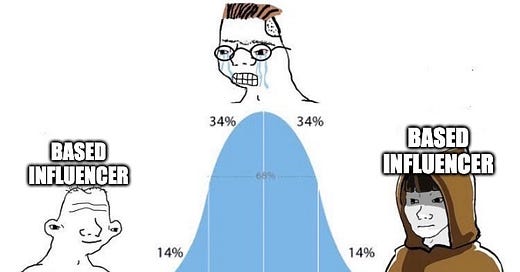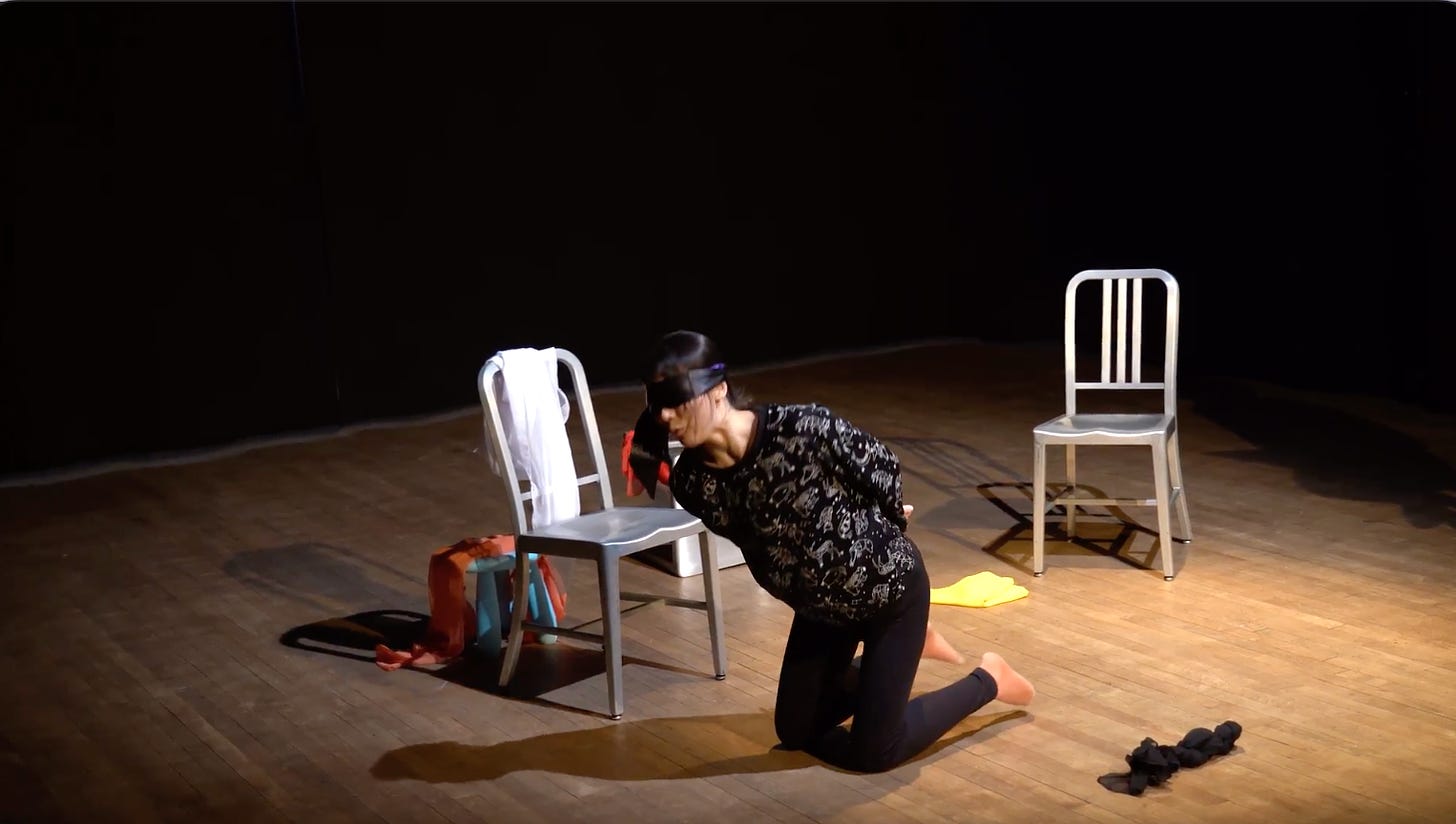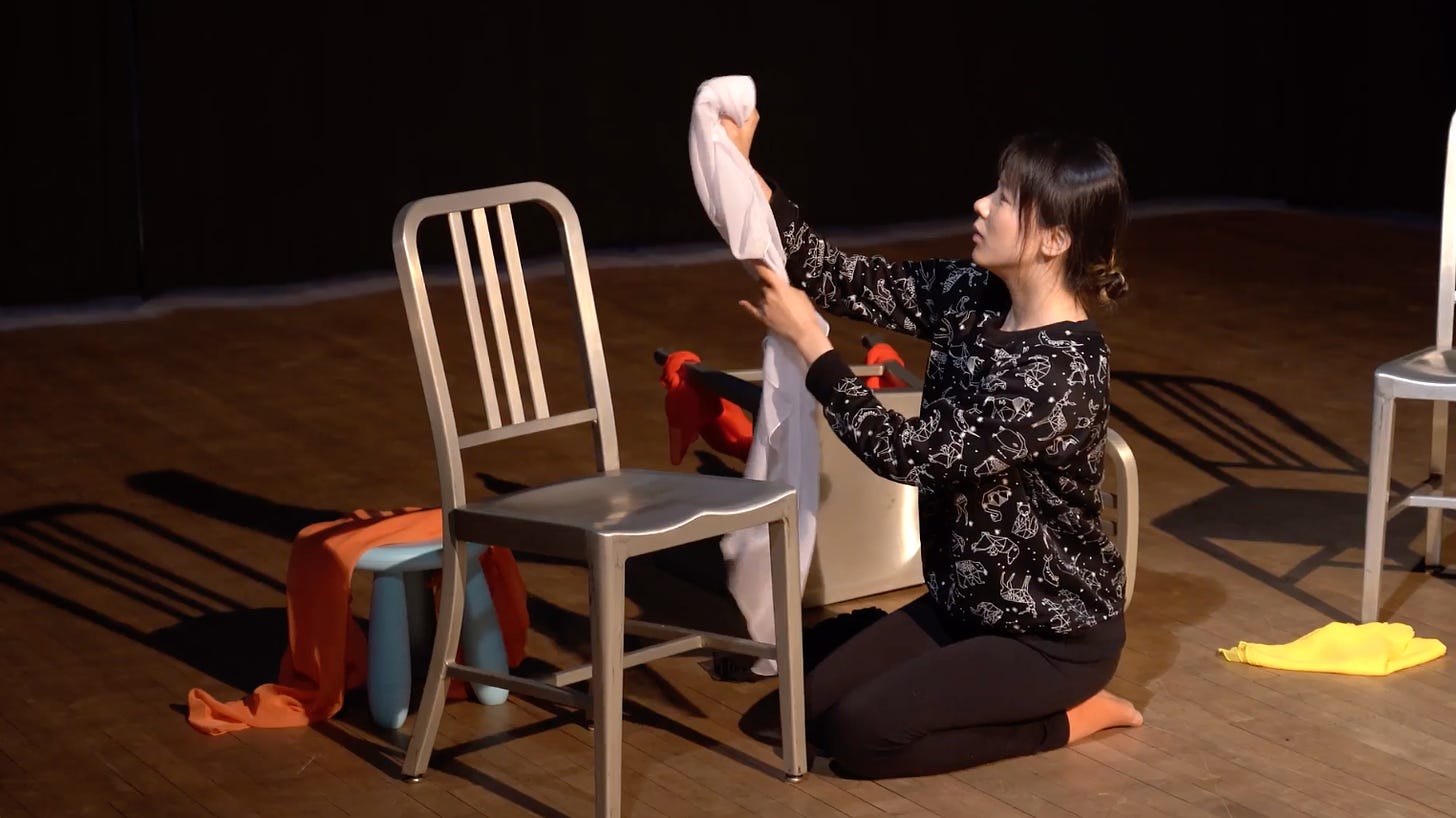How to be "based" in the influencer economy
An inquiry into authenticity via the lens of internal role-play
Lately, I've been thinking about the concept of "being based" – a term redefined by rapper Lil B as an unabashed embrace of one’s true self, free from the fear of societal judgment. This notion has morphed into a powerful tool for empowerment on social media, especially among creators and influencers who dare to reveal their unique, sometimes eccentric, selves. In my opinion, this unapologetic stance, a "me first" attitude echoing the rise of a super-solo economy of one-person teams, can be both liberating and damaging, particularly in the delicate dance between private authenticity and the public persona we brand and sell.
To keep users hooked in the sea of short-form videos and exploding tweets, influencers must craft niche and catchy content that’s consistently themed. I've observed relationship psychology YouTubers, with previously solid followings, pivot to TikTok, distilling complex human emotions into bite-sized videos like "things guys don’t know but make girls swoon." Even a childhood TV host, once revered for his serious content on a national channel, emerged in my social media feed, selling textbooks with the fervor of a sportscaster. His past as a national show host was his hook, each sale a testament to his credibility, anchored in his academic and television history.
A friend who rapidly grew his Twitter following emphasized the integrity of his key to success: Ruthlessly align your public content with your personal brand and execute it with discipline. Keep other interests for your alt accounts. I totally get it - If you are a meditation coach, don’t start randomly posting edgy 4chan memes - it muddles your message and dilutes your brand's appeal. Not to mention oscillation between political stances.
Yet, I can't help but question the cost when I see internet personalities fall apart as their carefully curated personas come cancelled. When we hastily idolize someone based on a few tags in their self-intro and top posts, are we complicit in the tragedy of our times, where multifaceted individuals feel compelled to confine themselves to a monolithic front with unwavering conviction in order to win?
This path, once committed, often ends up looking like a one-way street. You can’t easily walk back or steer away. Imagine switching from a self-help guru imparting ancient wisdom to a TikTok star showing off sensual dance moves, or dropping the glamor of a VC-backed, deep-tech entrepreneur and embracing the route of a Bohemian yogi, is not only challenging but costly. You might have to abandon your follower base if not totally ruin your established social capital.
Are we complicit in the tragedy of our times, where multifaceted individuals feel compelled to confine themselves to a monolithic front with unwavering conviction in order to win? This path, once committed, often ends up looking like a one-way street. You can’t easily walk back or steer away.
It is in this particular context that being “based” emerges as a liberating pushback against a reductionist view of identity, a rejection of adherence to a set of rigid values or cultural traits. The allure of 'being based' consists in its intentional inappropriateness, a deliberate breaking of character. The courage to be based appeals to an emotional core unbridled from calculated commercial packaging, tapping into that hidden impulse you’ve learned to cage as a result of social disciplining. You can eat whatever you want, wear whatever you like, say whatever on your mind and do whatever you enjoy. It's okay to hate him today and love him tomorrow. You can just be. No consequences.
On the other hand, it’s also a seductive approach for quick wins in an influencer economy that structurally incentivizes a “me first” POV more so than ever in history, where the “super solo-ers” are the new elites in the making. Your capital is your own self-expressions that belong exclusively to you – you own the brand and all relationships. All it takes is nothing more than compute, GPT API keys or a vlog setup, and the unwavering belief that you are “the one”. Your insights, your character, your technical and artistic adaptability – they all beat the curve.
The courage to be based appeals to an emotional core unbridled from calculated commercial packaging, tapping into that hidden impulse you’ve learned to cage as a result of social disciplining. You can eat whatever you want, wear whatever you like, say whatever on your mind and do whatever you enjoy. It's okay to hate him today and love him tomorrow. You can just be. No consequences.
But the danger of leaning into being “based” as a personal PR tactic is that it can backfire if you haven’t clarified who you are in all your contradictions. Usually, your un-censoring involves a flavor of self-vindication to reclaim the power taken from the less socially acceptable parts of you by mainstream scrutiny and market mechanics. However, when you mix a personal brand optimized for mass public marketability with a private outlet of push-backs, you are caught in a subtle yet undeniable sense of dissonance, as you may begin to secretly question more than you’d like to admit: am I being my vulnerable authentic self or simply marketing a version of vulnerable authenticity? Your vulnerability, once a genuine aspect of your personality, is carefully honed into a sharp weapon on display, detached from the messy complexities of the rest of you.
As you may begin to secretly question more than you’d like to admit: am I being my vulnerable authentic self or simply marketing a version of vulnerable authenticity?
Essentially, you need to realize that this nagging dissonance comes from letting one part of yourself that competes for power and recognition capitalize on the struggles of another part of yourself that’s already hurting as a result of not feeling enough in the gaze of the authority. It’s self-exploitation and self-empowerment rolled into one package deal. And you need to know that’s OKAY, too.
If anything, this internal rift encourages you to confront and embrace your multifaceted nature that is as inconsistent and in-flux as humanly possible.
Recognizing this murky complexity within you and confronting the interplay of your light and shadows head-on is not just an act of self-care; it's a necessary first step towards genuine reconciliation and integrated self-expressions. Once you understand that the power-seeking part and the hurting part both exist in order to protect you, you’ll be able to acknowledge and appreciate your vulnerability at both its most performative and most raw. From there, it’s a matter of testing and discovering where to draw the line - like a loving and fair parent who doesn’t play favorite, you don’t want either one to feel attention-starved or overshadowed for too long.
Recognizing this murky complexity within you and confronting it head-on is not just an act of self-care; it's a necessary step towards inner reconciliation and genuine, integrated self-expressions
As for myself, my exploration of this step began in a quite disruptive workshop series that exposed me to a modality I didn’t know existed before but found extremely disruptive: Psychodrama, or acting-based improv for insights into the self and others. It even inspired me to become a coach harnessing somatic role-play for self-growth in my free time.
In this psychodrama workshop series, I was surprised to sketch out five personas within myself, each of which had its own agenda. Together with my facilitator and other participants, we gave each of them a distinct voice, witnessed their desires and fears, and acted them out in semi-structured improv exercises.
In this self-revelatory odyssey, as I shuffled from one role’s body and perspective to that of another, I experienced a cathartic mixture of anger and grief. This was because, in that space, I was allowed to protest against the constraints of maintaining a singular professional, social, or online image. I was allowed to mourn for the parts of my identity that I had to sacrifice or kill along the way to win over social recognition.
In that arena, I had both the freedom to choose to be me (and my whole collection of 5 dispersed alter-egos), AND the freedom not to be chosen to be someone else.
This series culminated in a self-revelatory theater performance, where I became the sole director and actor of my internal theater, putting those roles in critical dialogue with each other as they navigated an internal labyrinth in search of a way out.
The transformation occurred when I played out the entire script in the witness of an intimate audience: I lingered around each role, caring for and extending to each one of them a gentle, loving gaze that I hoped I had always received from this world. As I was doing that, I felt submerged in a well of clear, purifying self-compassion and empowerment.
This personal journey sheds light on the broader narrative of 'being based' in our generation. While the market amplifies personal branding, it often leads to self-alienation and self-numbing. We're torn between embodying a consistently polished persona and owning the rich internal conflicts that make us human.
The solution, perhaps, lies in finding a balance between these two extremes. Ultimately, the essence of 'being based' in this era of digital omnipresence extends further than just securing a slot in the online marketplace. We owe it to ourselves to make space for that constant inner theater to unfold and to nurture the inevitable tensions in between our inner roles. After all, the journey towards authentic self-presentations is not about maintaining a semblance of coherence and consistency, but rather genuine self-inquiries and ownership of our inner conflicts.
Keep exploring, keep questioning, and most importantly, keep being you.






